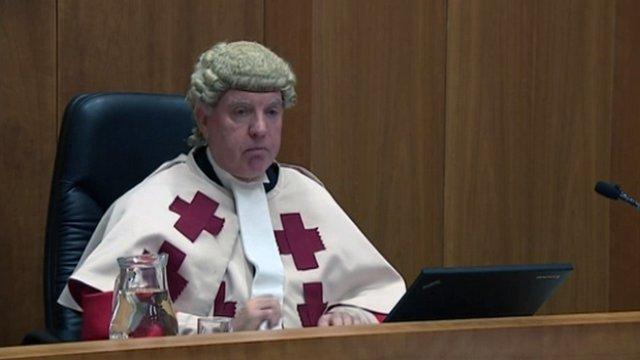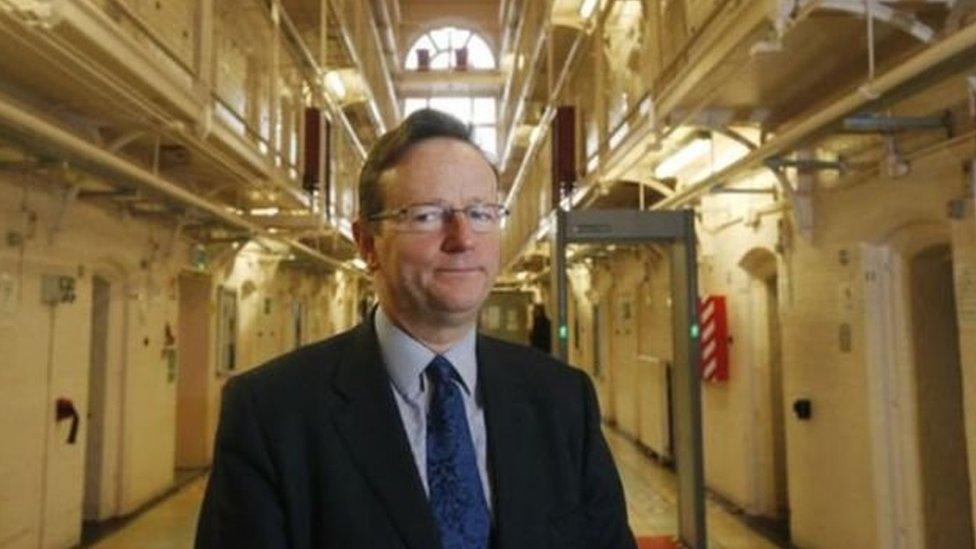Consultation on sentencing guidelines for Scots courts
- Published
- comments
Lady Dorrian said sentencing must take into account the circumstances of the offender and the impact on society
Members of the public are to be asked to comment on how offenders are sentenced by the courts.
The Scottish Sentencing Council has launched a consultation on new guidelines.
It said it would be the first time a comprehensive definition was provided for the principles underlying sentencing decisions.
Observers called for the guidelines to help courts ensure prison was not used as an alternative to the welfare state.
The body's first draft guideline sets out the principles and purposes of sentencing for all offences.
It is designed to assist judges in court and help the public better understand how sentences are decided.
Promote consistency
The consultation, which will run until 27 October, asks people to comment both on the principles and purposes of sentencing and on how easy the guideline is to understand.
The sentencing council has also created a website explaining how judges decide a sentence. This includes videos and an interactive scenario that lets people choose what happens next in a realistic court case, and then select the sentence they would give - if they were the judge.
The council, which is made up of judicial, legal and lay members, was established as an independent advisory body to promote consistency in sentencing across Scotland.

The new guideline is designed to assist judges in court and help the public better understand how sentences are decided
Its chairwoman, Lord Justice Clerk Lady Dorrian, Scotland's second most senior judge, said judges and sheriffs had a variety of factors to take into consideration when passing sentence.
"The overall principle is that the sentencing should be fair and proportionate," she told BBC Scotland.
"But that must take into account things like the impact on society, the circumstances of the offender, whether there needs to be a balance between the issue of punishment or the potential for rehabilitation.
"These are all matters for the individual sentencing judge, but they are all matters which are touched upon in this guideline."
She said sheriffs and judges would have a framework against which they could assess the sentence they were imposing.
"They are required to take into account any guideline and to follow it," she said.
"And if they don't take it into account, they must state that they have not taken it into account, and why."

The sentencing said those passing sentence should ensure similar offences are treated in a similar manner, that they are no more severe than necessary and reasons for sentencing decisions should be stated clearly and openly.
Professor Cyrus Tata, director of the Centre for Law, Crime & Justice at Strathclyde University, welcomed the publication of the guideline, which he said could lead to important changes in sentencing.
He said: "It's very important that we have a public principle which says 'we are not going to use imprisonment as, if you like, the last stop shop in the welfare state'.
"Too many people are ending up in prison at the lower end, not because they have committed serious violent offences - if they have, they need to go to prison - but because there doesn't seem to be anything else available in the community.
"And that's a tragedy, and it's crackers."
The organisation is developing guidelines on the sentencing of young people, and preparatory work is being undertaken in relation to the way sentences are dealt with regarding the offences of death by driving and wildlife and environmental crime.

Lord Matthews passed the longest sentence ever imposed by a Scottish court on the World's End murderer Angus Sinclair
It pointed out that if there was perceived inconsistency, the appeal courts could hear cases brought by the Crown if it felt the sentence was unduly lenient, or from the defence if there were grounds to suggest the punishment was too harsh.
On Sunday, Scotland's chief inspector of prisons David Strang called for an end to jail terms of less than 12 months and said it was clear that shorter sentences did not cut crime.
Scottish courts have operated a presumption against prison sentences of three months or less since 2010.
The Scottish government has been consulting on whether to extend that to 12 months.
In November 2014, Lord Matthews passed the longest sentence ever imposed by a Scottish court when he jailed World's End murderer Angus Sinclair for a minimum of 37 years.
- Published31 July 2017

- Published30 July 2017
